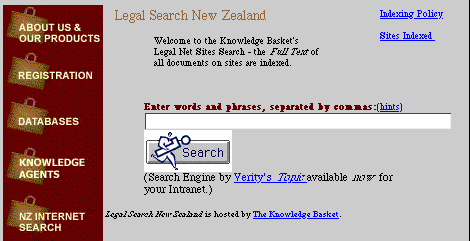
JURIST, launched in January 1998 what it calls a `Limited Area Search Engine (LASE)' to make searchable all home pages of law Professors and course pages of law subjects in its index.

At the time of this writing, a search for "Plato" on the Internet search engine, Infoseek, returned 1,506 responses. Of the first ten of these, only five had anything to do with the Plato that lived in ancient Greece, and one of these was a popular piece on the lost city of Atlantis. ... Add to this broad range of responses the fact that Infoseek returns ten entries per page, making it necessary to examine one hundred and fifty one pages of entries, many of which are irrelevant to a scholarly search of "Plato," and the result is a process that is frustrating and inefficient.
They identify advantages of the alternative, `targeted' approach:
By limiting the range of the search engine, a LASE strips out many unwanted references... The result is a higher quality index built for a specific purpose and for a smaller audience. Furthermore, the quality of the index, its purpose and the level of specialization expected of its intended audience are variables that can be manipulated with LASE technology.They also note that, because of its limited scope, it is possible for Argos to update weekly the indexes to all the sites it covers, rather than the couple of months that (in their experience) are taken by Internet-wide search engines to update sites. They estimate that this means that 98% of all links found by their search engine work at any given time.
Knowledge Basket, the New Zealand Internet content provider released Legal Search New Zealand[54]http://202.37.88.18/search/legsearch.html] in December 1997. It uses the Verity web robot and Topic search engine, and makes searchable 25 New Zealand law sites at present. The advantages they claim for this approach are similar to those described above[55]http://www.knowledge-basket.co.nz/kete/nzsearch.html].
